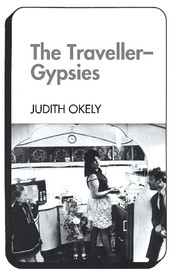Book contents
- Frontmatter
- Contents
- Dedication
- Preface
- 1 Historical categories and representations
- 2 Modern misrepresentations
- 3 Methods of approach
- 4 Economic niche
- 5 Self-ascription
- 6 Symbolic boundaries
- 7 Gorgio planning
- 8 Travelling
- 9 The trailer unit, spouses and children
- 10 Group relations and personal relatives
- 11 Gypsy women
- 12 Ghosts and Gorgios
- Concluding remarks
- Extract from The Scholar Gypsy
- Notes
- References
- Index
10 - Group relations and personal relatives
Published online by Cambridge University Press: 04 December 2009
- Frontmatter
- Contents
- Dedication
- Preface
- 1 Historical categories and representations
- 2 Modern misrepresentations
- 3 Methods of approach
- 4 Economic niche
- 5 Self-ascription
- 6 Symbolic boundaries
- 7 Gorgio planning
- 8 Travelling
- 9 The trailer unit, spouses and children
- 10 Group relations and personal relatives
- 11 Gypsy women
- 12 Ghosts and Gorgios
- Concluding remarks
- Extract from The Scholar Gypsy
- Notes
- References
- Index
Summary
Nations and leaders
The basic ideological division between Gypsy and Gorgio has national political significance in limited spheres: the common observances at national fairs and the solidarity in a crisis when a cross section of families are directly threatened by Gorgio authorities. In a conflict over encampment and land use, for instance, Travellers are expected to unite against Gorgios. But both here and in other contexts, Travellers may also be in direct competition with each other.
As is admitted by the Gorgio members and others of the Gypsy Council founded in 1966 (Acton 1974:163-85, 235-40), Travellers in England have only a vague sense of national identity and do not attach this to a common territory. The Gypsies encountered in this study did not appear to see themselves as part of an international movement, although they were always interested to hear about Gypsies elsewhere in the world.
The former Secretary of the Gypsy Council, Gratton Puxon, a Gorgio, supported the idea of a Gypsy homeland called Romanestan, but given the Gypsies' special place in relation to a larger economy this seems unrealistic. When Puxon argued in New Society (6 Dec. 1973) for the rights of free entry into Britain of Gypsies from the E.E.C., the Gypsy Chairman and Gypsy General Secretary of the Romany Guild replied with strong objections (New Society, 13 Dec. 1973).
There are no political units such as the three or four ‘nations’ (natsyia) of Rom found in North America (Sutherland 1975:180, 184-8) and elsewhere in Europe (Yoors 1967:134-5), i.e. the Kalderash, Machwaya, Churara and Lowara.
- Type
- Chapter
- Information
- The Traveller-Gypsies , pp. 170 - 200Publisher: Cambridge University PressPrint publication year: 1983

